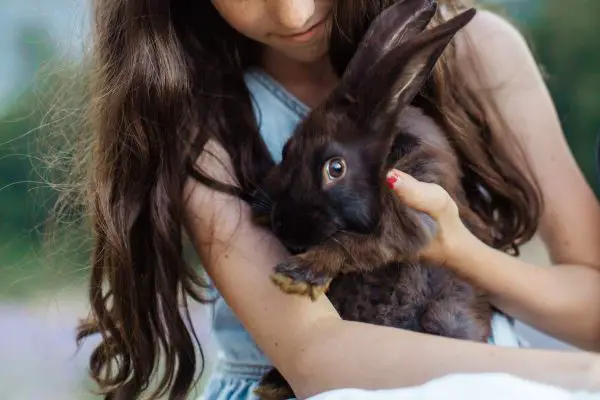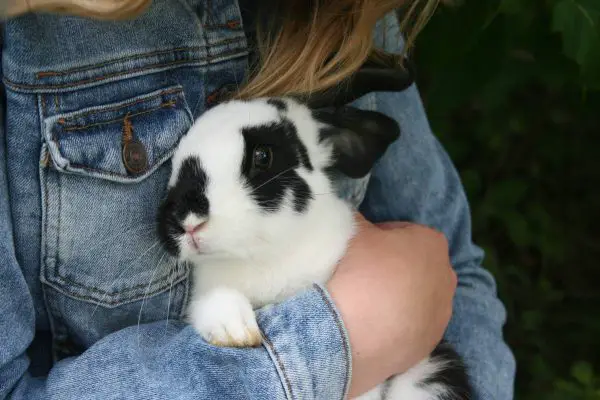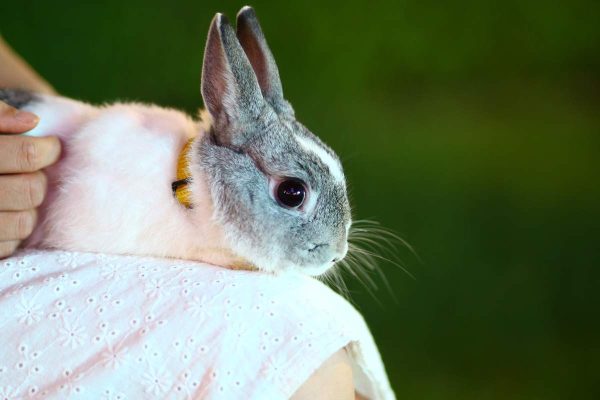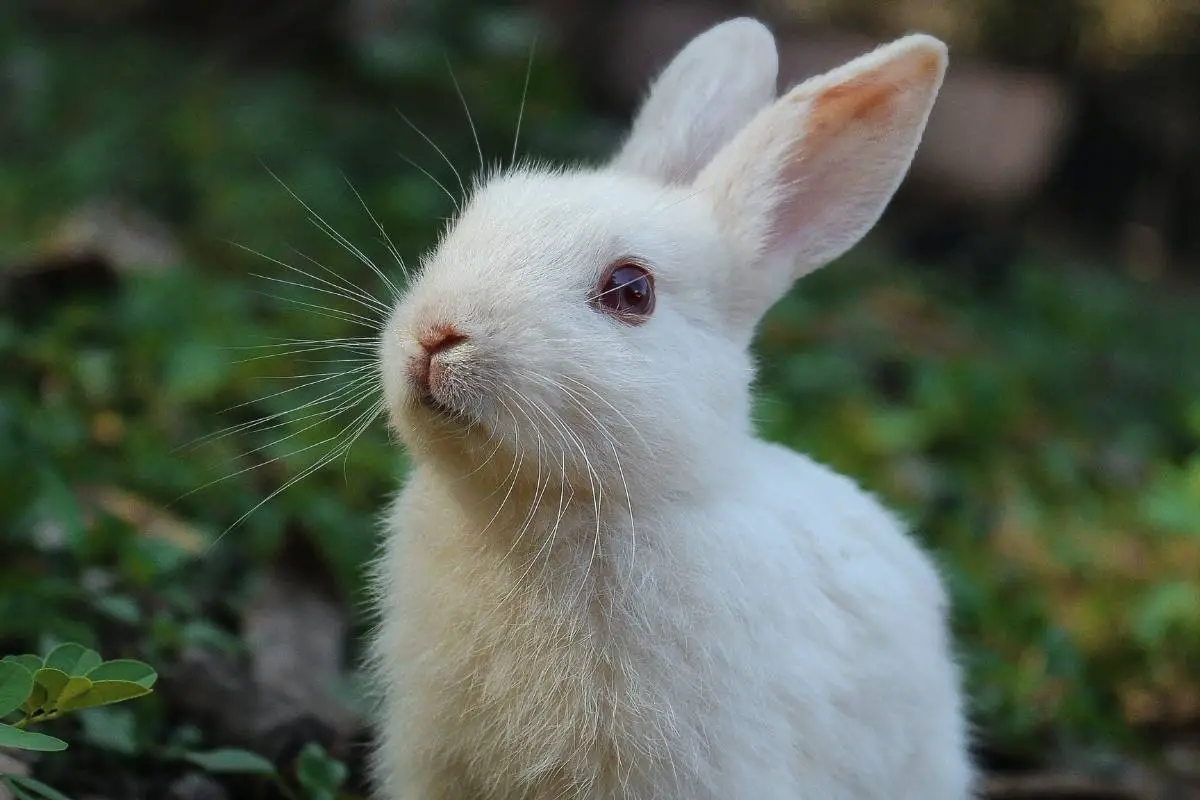Rabbits are constantly chewing, nibbling, licking, and eating for a number of reasons. Sometimes their choice of food or chew toy is understandable. Other times it can be a little bewildering, like when your rabbit starts gnawing happily on your hair.
So, why is my bunny eating my hair? It could be because your hair smells like something the rabbit considers food. Your rabbit also may not be eating your hair—it may be trying to groom you or make a nest. Finally, it may be nibbling your hair simply because rabbits are inclined to chew on anything they can get their mouths around.
This article will examine rabbit instincts that may be leading your bunny to make a meal of your hair and delve into whether or not you should be concerned about this behavior and the affects consuming hair can have on your rabbit’s health.
Why Does My Bunny Eat My Hair

Rabbits use their tongues and mouths to explore the world around them. Since they don’t have fingers, they rely on the sensors in their mouths to feel whether things are hard or soft, textured or smooth.
Their sense of taste can enhance their sense of smell, telling them more about what they are examining. Your bunny may lick or chew your hair simply because it is curious to learn more about it.
Mutual Grooming
Another reason your rabbit may lick or chew your hair could be that it is trying to groom you. Grooming is an important social activity among rabbits. They groom one another to show their trust and connection.
Grooming can also indicate social status—a dominant rabbit is more likely to solicit grooming from other rabbits, while a subordinate rabbit is expected to do most of the grooming.
Your rabbit perceives your petting to be a grooming gesture. If he wants to return the favor by licking and nibbling your skin or hair, it means he likes you and feels connected to and comfortable with you.
Pay attention to your rabbit’s body language when it licks or chews your hair. Signs of contentment include a relaxed posture, a quiet teeth-grinding that sounds almost like purring, and sometimes partially closed eyes. A rabbit that is relaxed and happy when gnawing your hair is expressing its affection and probably thinks it’s doing you a favor.
Attractive Fragrances
If you use fragrant shampoos or other hair products on your hair, your rabbit may be mistaking it for a tasty treat. Many hair products incorporate fruit, flower, or herb extracts or scents, which could tempt your rabbit to try a taste. This is an especially likely scenario if your rabbit most often tries to eat your hair when you have recently washed or treated it with a scented product.
Constant Chewing
As you’ve probably noticed, rabbits chew on practically everything. The fact that your bunny is chewing on your hair doesn’t necessarily mean it’s eating it. Rabbits do eat off and on for the entire time they are awake—it keeps their digestive system working smoothly.
They are also constantly chewing and wearing down their teeth, which otherwise would grow inordinately long. Nibbling and gnawing are instinctual for them and give them a feeling of pleasure and satisfaction.
Young rabbits are especially notorious for chewing on anything and everything. In time, a young bun may grow out of chewing on your hair.
Why Rabbits Tug and Dig in Hair

Some bunnies can get a bit rougher, tugging, tearing, or even digging at your hair. Again, this is often the result of misdirected instincts. In their natural outdoor environment, rabbits do a lot of digging in grass, leaves, and sticks and will often nibble on plants and underbrush to clear the area they are working on. In the house, fabric, carpet, and hair often fall prey to this behavior.
Nesting Instincts
A rabbit that tugs and digs at your hair may be trying to arrange it to suit them. Some rabbit owners notice that their rabbit digs and tugs at their hair most often when it is braided or spread against the floor. This could be a result of a rabbit’s nesting instinct. Hair is similar to the fine grass rabbits make their nests in.
If you have ever seen a rabbit preparing a nest site, you know how industriously they will gnaw down twigs, cut back weeds, and arrange the grass and dirt to their liking. Female rabbits also pull some of their own hair to line their nests. A bunny who is chewing and arranging your hair due to her desire to nest may get carried away and try to tug some of your hair out as well.
Dangers of Rabbits Eating Hair
A rabbit really should not be eating your hair. Not only is it likely to give you a lopsided trim, ingesting your hair can be dangerous for your bunny. First of all, shampoos, dyes, and other hair products often contain chemicals that can be toxic to small animals. Remnants of them that remain on your hair can easily upset your rabbit’s stomach or cause other negative reactions.
Rabbits regularly ingest a bit of their own hair when they are grooming themselves. However, ingesting too much hair can cause a matted hair ball to form in the rabbit’s digestive tract, blocking its digestion. This is called a trichobezoar and can be fatal if not properly treated.
Trichobezoars (Hair Balls)
Rabbits are especially at risk of developing a trichobezoar if they have not been drinking enough water, consume a diet that is too high in carbs and too low in coarse fiber (hay), have recently been sick or stressed, or don’t get enough time out of their cage to run around. Signs that your rabbit is suffering from an intestinal blockage include:
- A swollen or painful abdomen
- No appetite
- Weight loss
- Few or unusually small fecal pellets
- Diarrhea
- Lethargy
- Hunched postures
- Loud teeth grinding
- Avoids contact
A rabbit with these symptoms should see a vet as soon as possible, but if your rabbit has no symptoms, don’t worry too much. Swallowing a few nibbles of your hair is not enough to cause a hair ball blockage.
You can decrease the risks of your rabbit developing this issue by feeding a well-balanced diet, making sure your bunny always has access to clean water and high-quality grass hay, and giving it daily opportunities to get out of the cage and run around.
You should keep a closer eye on your rabbit if it’s recently been ill or could potentially be suffering from stress. Make sure it is continuing to eat and drink and has normal fecal pellets. You can also decrease the amount of its own hair your rabbit is likely to ingest by gently brushing it on a regular basis.
How to Stop a Rabbit From Eating Your Hair

There are several ways you can stop your bunny from chewing and eating your hair. The first is to simply keep your hair out of reach. Keep your rabbit on the floor or in your lap when you play with it. If you like a little face to face time, pull your hair back away from your face or wear a hat.
Other Foraging Opportunities
You can also distract your rabbit from your hair by giving it other things to play with, gnaw on, or dig about in. Whenever it starts chewing your tresses, direct its attention toward something it can safely nibble on or rummage about in. You can even make your own foraging toys for this purpose.
- Cardboard tubes stuffed with some of your rabbit’s favorite treats
- Paper bags stuffed with hay and treats
- A digging box filled with soil, paper strips, or hay (you can also hide treats in this)
- Old towels, rugs, or blankets to dig around in
- Clean, untreated fruit tree branches for chewing
If possible, let your rabbit enjoy some supervised time outdoors in a safe, fenced-in area. This will give it a chance to dig in and nibble on natural items rather than your hair.
Spay and Neuter
Getting your rabbit spayed or neutered will also go a long way in decreasing hormone-driven behaviors like nesting and hair pulling. It won’t decrease your rabbit’s affection for you or attempts to groom you, but it will help temper more aggressive behaviors like mounting or scratching.
Conclusion
A rabbit that is nibbling, licking, or chewing your hair probably isn’t actually trying to eat it, but there is still some danger involved in allowing this behavior to continue—not only to your hair, but also to your bunny. Thankfully, there are a ton of ways you can redirect your rabbit’s instinctual desire to groom, dig, gnaw, and nest toward safer, more natural options.
Your rabbit will find equal or greater satisfaction investigating foraging opportunities and nibbling rabbit-safe goodies once you’ve distracted it from your hair. Not only that, you’ll be enriching its life with activities that stimulate its brain and catch its interest.

